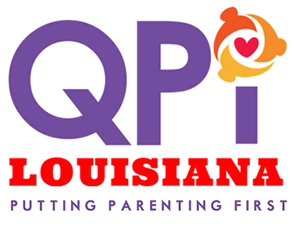Help us protect Louisiana's children. Call 1-855-4LA-KIDS (1-855-452-5437) toll-free, 24 hours a day, seven days a week.
Report Child Abuse & NeglectQPI History

QPI was developed in partnership with the Youth Law Center in San Francisco, CA and the University of Southern Florida. Carole Shauffer, JD, as the Executive Director and Senior Director of Strategic Initiatives for the Youth Law Center, co-created QPI, which is focused on developing positive culture change within the child welfare system through the recruitment and retention of quality foster parents. As of July 2017, QPI has been implemented in over 20 public and private child welfare systems across 10 states.
Louisiana QPI Dates/Activities
April 2016 - Initial State Planning Meeting
DCFS Leadership, Casey Family Services, and Youth Law Center Meeting to discuss DCFS interest and commitment to the implementation of QPI. The decision to implement in two initial sites -- Lafayette and Covington Regions -- followed by all other regions.
- July 12-13, 2016 - Lafayette Region Kickoff
- July 14-15, 2016 - Covington Region Kickoff
- August 10, 2016 - State Kickoff - Baton Rouge
Statewide meeting held at Healing Place Church with more than 100 foster parents, birth parents, community stakeholders and staff participating.
Nov. 9, 2016 - State Steering Committee
Dec. 17, 2016 - DCFS State/Regional Management QPI Presentation and Kickoff Preparation
- February 21-22, 2017 - Thibodaux Region Kickoff
- February 23-24, 2017 - Orleans Region Kickoff
- April 4-5, 2017 - Lake Charles Region Kickoff
- April 6-7, 2017 - Alexandria Region Kickoff
- April 25-26, 2017 - Monroe Region Kickoff
- April 27-28, 2017 - Shreveport Region Kickoff
- May 23-24, 2017 - Baton Rouge Region Kickoff
Final kickoff held. Over 1,200 foster parents, community stakeholders, birth parents and staff participating in regional kickoff meetings across the state.
All regions implementing QPI with regionally identified areas of focus to improve the care of children and support Quality Parenting Initiative.
May 24, 2017 - State/Regional QPI Leadership Meeting
Ongoing meeting held to share information and implementation strategies and results across the state.
Initial implementation included educating the entire child welfare system about changes in the foster and adoptive system. Among these were changes to curriculum and policy development new training for staff, stakeholders, foster parents, providers, legal stakeholders, and others, and new online educational resources for staff and foster and adoptive parents. The goal was to improve recruitment and retention of foster parents, increase the quality of the foster care experience and support more timely permanency for foster children. See www.QPI4kids.org for more information.
Pilot Regions
Lafayette and Covington regions were the first to roll out QPI, but all nine regions have now presented initial implementation plans. Every region has received an enthusiastic response from the community and a commitment from partners to implement actions and strategies that support quality care for children in the DCFS child welfare system.
Relationships Between Workers, Biological Parents, Foster Parents
At initial kickoff meetings held in each region, all members of the community's child welfare system acknowledged the need to improve communication and the exchange of information. Each region has identified strategies for improving working relationships at all levels, including additional opportunities for foster parents and birth parents to meet and share information about the child and each other as they become more familiar and comfortable in their relationship.
Groups suggested:
- Providing birth parents with information about the foster home to help relieve their anxieties.
- Initiating phone calls between foster parents and birth parents at the time of placement to allow birth parents to receive and share information about the child and assist in the child's care.
- Incorporating more intentional and earlier visits between children and their birth parents.
- Establishing regular informal communication between foster parents and birth parents to discuss the care of the child.
- Providing opportunities for birth parents to attend medical and other appointments for their child while they are in foster care.
Some of the specific strategies regions are implementing include:
- In some regions, judges are chairing and/or participating in work groups to improve the court experience for foster children and their families.
- Judges are developing strategies to improve relationships between agency staff and the court. They use informal meetings and brown bag lunches to address issues and familiarize participants with expectations.
- Some regions are focusing on specific steps to improve the relationship between birth families and foster families. This makes the child feel more secure and helps families work together to meet the specific needs of the child.
- They are focusing on reducing and addressing the trauma a child experiences when he or she is removed from the family.
- They are designing strategies for improving communication between all members of the child welfare team.
- They are focusing on transitions, such as when a child must move from one home to another. The goal is to reduce the number of times a child is moved but also the trauma associated with moves.